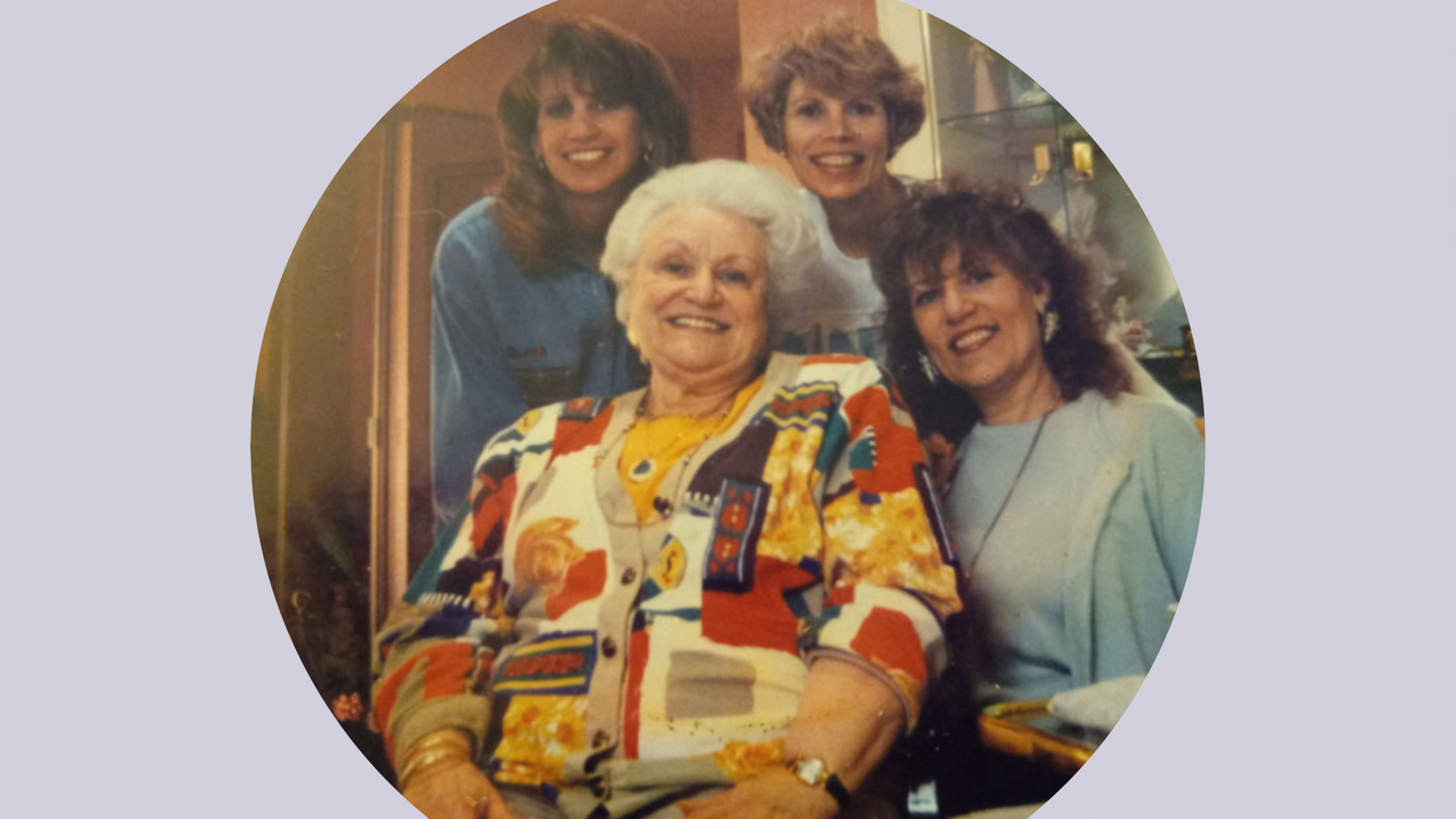Acceptance
Though my mother was an extremely critical person, there’s no debate that she loved her children and wanted only the best for them. I didn’t know that most moms give many hugs and kisses to their children, especially when they’re little. But I didn’t miss the fact that we never received such affection from her because throughout my life, mom showed her love in other ways.
The summer I was about eight years old, all my friends were going to camp. My older sister had a babysitting job, and my younger brother had plenty of boys in the neighborhood to play with. I was dragging myself around the house with the long face of a sad child. My astute mom could read her children like a storm cloud. “Linda, honey, the baby’s napping, and I’m bored with cleaning. How about we go on the front porch and play jacks?” Wow, my mom was going to play with just me, a rarity for a woman with four children. I can’t be sure, but I think she might have let me win.
In 1958, we had a tremendous snowstorm that caused school cancellation for two weeks and was much too deep for us to play in. Mom taught the four of us who were old enough (we had a new baby sister by then) to play Mah Jongg. I thought she was the coolest mom ever. I was too young to realize she did it for her own sanity. All these years later I’m playing that game with my friends. I still have Mom’s old set.
My first husband and I split up when our daughter was just 18 months, and our son was five years old. Their father escaped to the west coast and sent no money. I did odd jobs such as babysitting, laundry, some random typing, but money was short. Every Friday Mom would tell me to bring the kids and come for dinner. After the meal, she’d lament, “I don’t know why I always cook so much. It’s just me and Daddy now. Linda, why don’t you take the rest of this food home?” She wasn’t fooling me.
I was 33 when I met the man I believed to be the love of my life, and he became my second husband, but he wouldn’t, or couldn’t, stop drinking. Because of the tenuous situation at our house, I escaped to my parents’ home and sent my children to California to stay with their father for the summer. Mom took care of me as if I were a five-year-old, cooking my favorite food, putting my clothes in the laundry with her own, and taking me shopping. “You need something new and pretty to cheer you up,” she said. She bought me a beautiful 2-piece dress that cost $100 which was quite a bit of money then. I still have that dress though I no longer wear it.
Mom’s Other Side
But Mom’s other side often reared its ugly head. My siblings and I would cower as she used her “mean mother” voice when criticizing us. Mom would criticize my clothes: “Are you really going to wear that skirt to work?” she asked when I was leaving for my second day of my first real job. Mom constantly picked on my hair, usually saying, “Linda! Get that rat’s nest out of your eyes!” Then she’d add a left-handed compliment. “Your eyes are much too pretty to hide with that mop of yours.” The worst was my choice of men. It would go something like this: “I can’t believe you’re still dating that Bob.” I must admit, she was often right about the men. She did, however, adore Stuart, my third (and final) husband.
After my first husband and I bought a home, she criticized my curtains, my colors, my serving trays, even my dinners when she was a guest in my home! I remember the first time my parents had dinner in our new home when I was a young bride, Mom started. “Chicken’s overdone.”
“Tastes fine to me,” my dad said while giving Mom “the eye.”
“Well, Linda won’t learn if no one tells her,” Mom replied with a huff. But she ate the chicken.
In her elderly years (after my dad died of cancer), Mom had gained a great deal of weight, let her diabetes get the best of her, and was pretty much house-bound. Every Saturday I’d visit her and prepare lunch for us. As she rarely got out of bed, I’d bring our lunch to her room and set it up on a T.V. tray. I’d help her transfer to her wheelchair and as we ate, we’d chat about my job, my kids, my husband, and anything she wanted to talk about. Actually, it was very pleasant and nice to have my mom all to myself, always an issue having grown up in a large family.
One Friday I awoke with a bad cold and did not go to work. I called my mom that evening to let her know I wouldn’t be coming to see her the next day. “I can hear the cold in your voice. Don’t come if you’re sick. You take care of yourself, and don’t go back to school until you’re well.”
“Mom, I promise I’ll wait til I’m better,” I said, reverting to my child self.
“Well, I hope so. I’ll see you next week.”
I spent the whole weekend nursing myself back to health and was feeling reasonably well enough to return to work on Monday. Unfortunately, we were having a deluge of rain that day. But really, I was better, and my students were happy to see me. I was still somewhat nasally, and a bit of a cough was lingering. The girls were quite solicitous (an advantage of teaching girls rather than boys), and I had a very good day.
Learning Acceptance
When I returned home from school, the phone was blinking. I pushed the button to hear my mother’s voice. “Well, I guess you don’t care if you have a relapse! I can’t believe you went to school in all this weather! I don’t know where your brain is!” CLICK
Anger was seeping from every pore of my body. I paced back and forth. I tried to grade papers but all I heard was that mean, screeching voice berating me—for what? Doing my job? Caring about my students? Not worrying about a little rain? (Well a lot of rain, but still …) I saved the message to play for my husband so he could hear how awful she could be.
“So,” was his response.
“SO! S0? Didn’t you hear that meanness in her voice?”
My husband, ever the teacher, the professor that he is, replied, “Yes, but that’s how your mother is.” He always takes her side!
“I know, but why does she do that? Couldn’t she say the same thing nicer? Couldn’t she say ‘Well, I hope you’re better. Too bad you had to go out in such awful weather. It would be a shame to have a relapse. I hate to see you sick.’?”
“Your mother has not talked like that for 80 years. Why would she start now?” my husband sighed with a note of exasperation.
“Because she’s my mother! She should be nicer,” I said almost in tears.
“You always say that, and she never is. How many times have we had this same discussion? Here’s what I think. You have two choices. You can either accept your mother for who she is and stop complaining about it, or you can tell her how you feel. If you’re not going to tell her, then you can’t complain.” And he was finished with that conversation.
The following Saturday, as we were eating the lunch I’d prepared, she started: “There’s too many chips. I don’t want all these.”
“Just eat what you want, Mom.”
“It’s too much lettuce. Roughage upsets my stomach.”
“Then don’t eat it.”
“This plate is so small. Why didn’t you use the dinner plates?”
Remembering my husband’s advice, I knew what I needed to say. “Mom,” I said quietly, looking directly into her eyes. “I came to visit you and have lunch and be happy together. None of this stuff matters, and I don’t want you to pick on me. I want us to enjoy each other.”
She was very quiet for a moment or so, and I said a silent prayer that I had chosen the right course. Perhaps Mom had some instant insight about how her critical way was hurtful. I can’t know what was in her head and I must admit I found it hard to believe, but without even trying to defend her words with lame excuses, she looked at me compassionately and said, “I’m sorry, honey. I didn’t mean to criticize.”
And that was the last time she ever did. My mother lived two years after that, and they were the best years we had together.
When she was in Sinai Hospital, dying, our entire family was there in the hall outside her room (her five children and their spouses, ten grandchildren and spouses of those who were married, and even one great grandchild). She wanted to talk with each of the grown-ups individually. When it was my husband’s turn to visit with Mom, he was with her somewhat longer than the other spouses. I was leaning against the wall wondering what they were talking about. When he finally left her room, I asked him “What did she say?” He encircled me in a tender embrace and said, “Your mom told me to ‘take care of my girl.’” This has been with me since and always has the same impact of feeling her love.
I found myself wishing I’d learned sooner to speak up for myself, but two years is better than none.
Over many years, I have reflected on and discussed with my husband the special visit that changed our relationship. Through those conversations, I realized that Mom really did want the best for her children and was offering advice and compassion as she saw necessary. I don’t believe she ever realized that her harsh criticisms were not helping and, in fact, were hurting me. Of course, this was never her intention. I believe my words that day brought this to her attention, and that’s why she never did it again. All of her “criticism” became suggestions offered with care.
I will always be grateful to my wonderful husband for helping me come to this realization.
Read more by Linda Miller.

